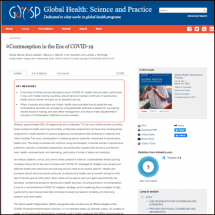Contraception in the Era of COVID-19
The World Health Organization (WHO) recognizes that countries are at different stages of the COVID-19 epidemic/transmission scenario. However, public health measures that WHO recommends for all scenarios include physical distancing.To ensure continuation of contraceptive access and services, including counseling and shared decision making, a number of adaptations to existing systems are required. In particular, maximizing the use of a “no-touch” approach to care whenever possible is essential.
As medical systems, clinics, and communities prepare to meet an unprecedented threat causing increased demands for the care of people with COVID-19, strategies to mitigate virus spread and optimize health care resources are evolving and will need to be country specific. Health care providers should strive to ensure continuity of reproductive health care to women and girls in
the face of facility service interruption.
Even while annual exams and nonurgent appointments are canceled, maintaining access to reproductive health services, including provision of contraception, is key to a comprehensive COVID-19 mitigation strategy and to sustaining the successes of high-quality family planning services that contribute to lowering maternal mortality and improving newborn and child health.
Last modified: November 19, 2021
Language: English

